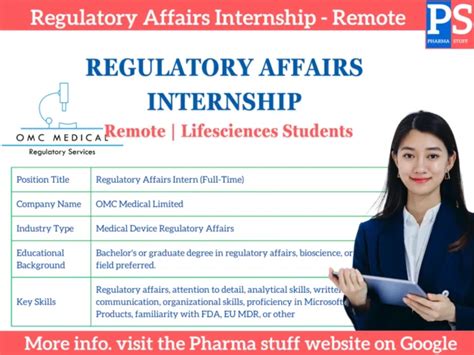Introduction

Regulatory affairs plays a pivotal role in the pharmaceutical, biotechnology, and medical device industries. Individuals pursuing careers in regulatory affairs serve as gatekeepers, ensuring the safety, efficacy, and quality of products that reach consumers. As an intern in regulatory affairs, you will gain invaluable experience that will prepare you for success in this dynamic field.
Understanding the Role of Regulatory Affairs
Regulatory affairs professionals translate scientific and medical information into regulatory submissions and support companies in meeting regulatory requirements. They engage with regulatory agencies, such as the U.S. Food and Drug Administration (FDA), to ensure product compliance and maintain market access. According to the Bureau of Labor Statistics, the median annual salary for regulatory affairs specialists in May 2021 was $92,070, with the top 10% earning more than $145,000.
Benefits of a Regulatory Affairs Internship
- Practical Experience: Internships provide hands-on experience in regulatory processes, document preparation, and stakeholder collaboration.
- Skill Development: You will develop essential skills in data analysis, writing, communication, and scientific knowledge.
- Networking Opportunities: Interns meet industry professionals, build connections, and learn about career paths in regulatory affairs.
- Enhanced Resume: A successful internship strengthens your resume, demonstrating your commitment to the field and your ability to apply theoretical knowledge.
Finding and Applying for Internships
- Research Companies: Identify companies in the pharmaceutical, biotechnology, or medical device industries that offer internships.
- Utilize Job Boards: Search job boards like Indeed, Glassdoor, and LinkedIn for regulatory affairs internship postings.
- Network: Attend industry events, reach out to professionals in your network, and inquire about potential opportunities.
- Prepare a Strong Application: Craft a tailored resume and cover letter highlighting your relevant skills, experience, and career goals.
Common Mistakes to Avoid
- Lack of Preparation: Research the company and industry before applying. Prepare for interviews by reviewing common interview questions.
- Unprofessional Communication: Use professional language and tone in your resume, cover letter, and during interviews.
- Neglecting Soft Skills: Regulatory affairs requires strong communication, teamwork, and problem-solving skills. Demonstrate these abilities in your application and interview.
- Limited Follow-Up: Follow up regularly after submitting your application and attending interviews. Show your interest and determination.
FAQs
1. What are the typical responsibilities of a regulatory affairs intern?
Interns may assist with data gathering, drafting regulatory submissions, conducting literature reviews, and preparing presentations.
2. What is the difference between regulatory affairs and clinical research?
Clinical research focuses on evaluating the safety and efficacy of investigational products, while regulatory affairs ensures compliance with regulations and facilitates product approval.
3. What kind of academic background is preferred for regulatory affairs?
Individuals with a science-based undergraduate or graduate degree, such as biology, chemistry, or pharmacology, are well-suited for regulatory affairs.
4. How long do regulatory affairs internships typically last?
Internships typically range from 6 to 12 months in duration.
5. What are the career opportunities in regulatory affairs?
Regulatory affairs professionals can advance to roles in regulatory operations, clinical trial management, product development, and compliance consulting.
6. What is the importance of continuing education in regulatory affairs?
Regulatory requirements and industry best practices are constantly evolving. Continuing education is essential for maintaining professional competence.
7. What resources are available to help regulatory affairs professionals stay informed?
Industry associations like the Regulatory Affairs Professionals Society (RAPS) provide educational programs, networking opportunities, and access to regulatory intelligence.
8. What are some of the challenges faced by regulatory affairs professionals?
Challenges include interpreting complex regulations, managing global regulatory harmonization, and navigating the approval process for innovative products.
